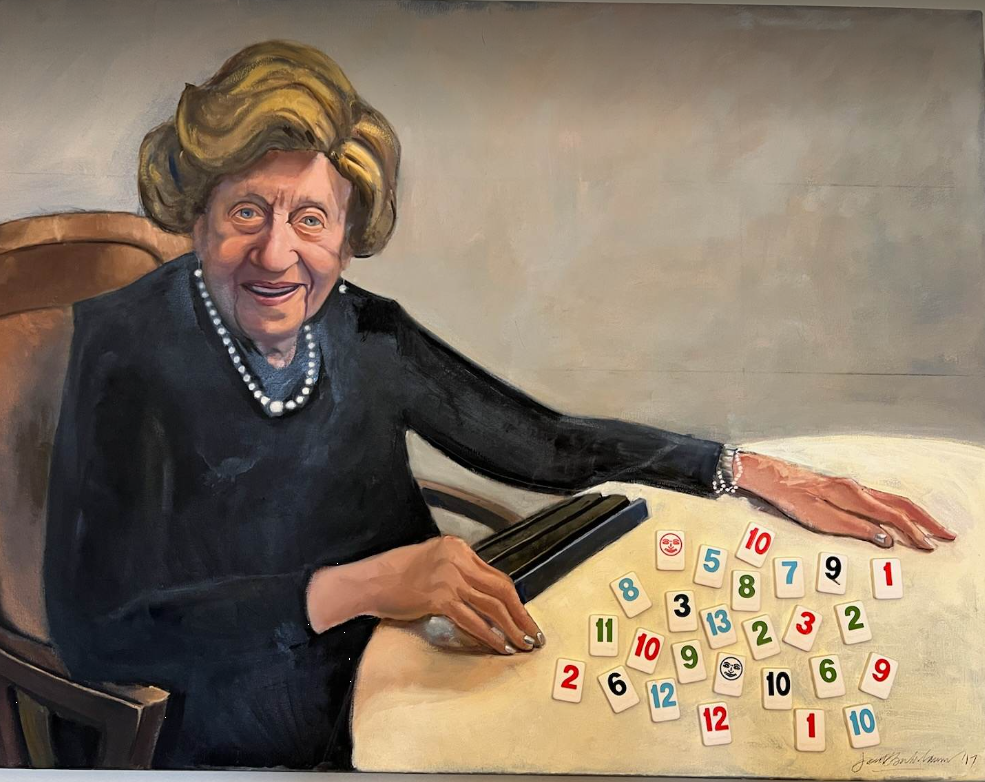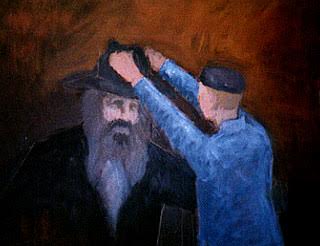
[Image: Jacob Buksbaum’s painting of his mother, Sara, who survived Nazi work camps during the Holocaust.)
Today, Holocaust Memorial Day, marks the liberation of Auschwitz concentration camp 77 years ago. The following story is about my husband Jacob’s parents, who were forced into work camps during the Holocaust. This close connection serves as a reminder that these atrocities did not happen long ago and are part of our very recent history. As we remember those who died, their families, and those who suffered and survived, it is important to also remember that we all must commit to speaking out against antisemitism and hateful speech and action against all people.
The following excerpt is from my debut memoir SOARING into Strength: Love Transcends Pain.
The day after I met my husband Jacob 38 years ago, we met for lunch at a local café to share stories and learn more about one another.
“You might find this shocking, because, even though I’m twenty-five years old, I have never met a Canadian before,” I said. “You’re so exotic!”
He laughed so hard he practically spat out his herbal tea. “My parents arrived in Canada after living in a displaced persons camp after the Nazis decimated the Jewish community in Poland during the Holocaust,” he said.
“Wow, that’s a heavy legacy,” I replied.
“Believe me, I know,” he smiled a sad smile, which made me feel even closer to him. “My mother was the youngest of nine siblings,” he continued. “Six of them were murdered by the Nazis.”
This included the oldest sister of his mother’s family Pessie, who was killed in a concentration camp along with her young son Abraham Joshua.
Before the war broke out, anti-Jewish hostilities were on the rise. Jacob’s mother Sara had been twenty at the time. With her ash-blonde hair and hazel eyes, she could “pass” for German. That’s how it became her job to travel to the larger cities selecting merchandise from cloth and shoe manufacturers to procure supplies for the family store, located in the main square in her Polish village. Her parents sewed the money into the padding of her bra and the lining of her dress and coat, which made her self-conscious, but it seemed to be the safest way to move the money during dangerous times. On one of these trips, the train was filled with German soldiers and one of them kept staring at her ominously. In perfect German she blurted out, “What are you staring at? Haven’t you ever seen a woman before?”
When she got off the train at the platform in her village, she was shaking. She walked home quickly, relieved that the soldier hadn’t questioned her further.
Jacob’s mother was sent to a work camp instead of a concentration camp. She worked as a seamstress for a German officer’s family, in an assembly line putting together grenades in an armament factory, and also in kitchen duty peeling potatoes for all the workers.
Meanwhile, Pessie and the baby were sent to the concentration camp where they did not survive and Pessie’s husband Moshe—Sara’s brother-in-law—was shipped to different work camps where he had to do hard labor.
After the war was over, Sara and Moshe found themselves in the same displaced persons camp, where they were married.
Throughout the war, Jacob’s father took it upon himself to collect names of living and deceased people from every new person who arrived in his work camp. This was a sacred act of courage that he undertook because Jewish law forbids a person to remarry if they are still married to someone else. One thing was certain, if the Nazi officers found out that he was creating a secret roster of who was alive and who had died, he would surely have been shipped off to a concentration camp or killed on the spot. Even though he knew the risk of this holy endeavor, as each new person entered the barracks, he was able to get them to quietly share new information as he scribbled more names onto his list of who was alive and who had died. Despite the potential life-threatening repercussions, this project was an act of faith because Moshe believed that, when the war was over, he would be able to help people reunite with loved ones or help them find closure by knowing when and where their family members had died. Every night when all the men were sleeping, Jacob’s father dug holes in the dirt floors of the barracks and hid these lists of names, dates, and locations scrawled in tiny letters.
After the war, many people spoke about this quiet heroism. When the Queen of Belgium learned of it, she wanted to knight Jacob’s father, but neither of his parents wanted to return to Europe. He didn’t need the honor because God knew his actions.
I was moved by the story because, although I had studied the Holocaust in school, I didn’t really have a personal connection to this dark chapter of history. “Thank you for telling me about your parents,” I said to Jacob quietly.
Today, 77 years after the liberation of the Auschwitz concentration camp, each one of us must ask ourselves to remember. More importantly, we must make that commitment to speaking up and standing strong against acts of antisemitism and also violence, hate, and injustice toward all people who are marginalized and oppressed because of their gender, class, sexual orientation, race, or ethnicity.


